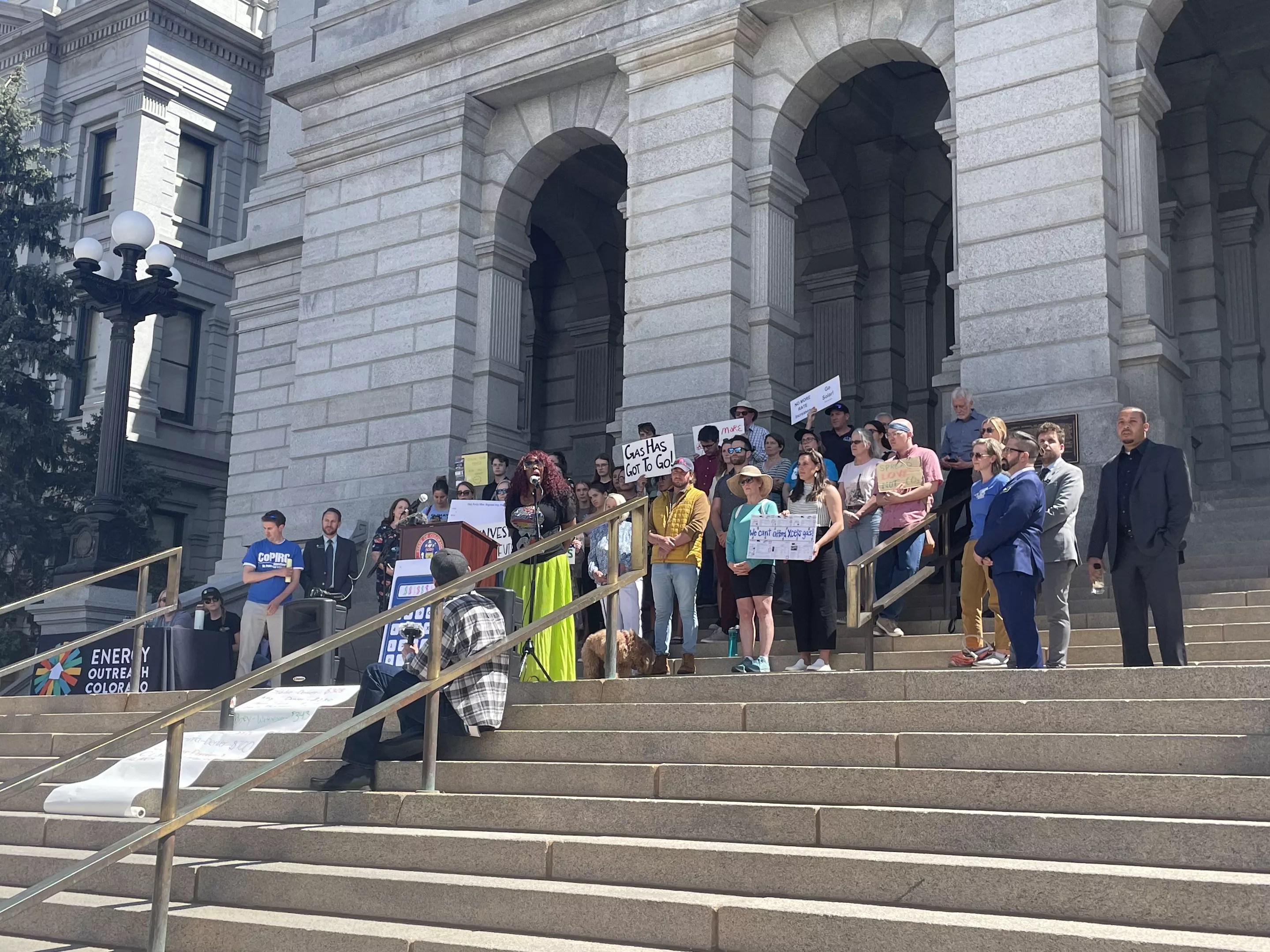
Grant Stringer

Audio By Carbonatix
Back in December 2022, metro Denver residents got a not-so-cheerful message mixed in with their holiday cards: Energy bills were going up – way up, it turns out.
In the following months, residents reported seeing hundreds of dollars’ worth of increases compared to the previous year.
Now the Colorado Legislature has taken action in the form of a bill that aims to regulate utilities more effectively and bring rates down. SB23-291, Utility Regulation, is a wide-reaching bill that requires more transparency from utilities and aligns incentives around natural gas spending in order to better serve customers.
“Consumers have been suffering. We simply need to create a better balance,” said Senator Lisa Cutter, one of the bill’s four sponsors, in an April 20 Senate Finance Committee hearing. “Public utilities are just doing what we let them do. We created this system. They’re making the most of the system that governs them.”
SB 291 would change that system to prevent future spikes in energy costs – which the recently formed Joint Select Committee on Rising Utility Rates found were tied to the volatility in the commodity price of natural gas. Utility companies pass on the commodity price of natural gas to customers through quarterly bill adjustments…so whatever the utility pays, the customer pays.
The proposed bill would change that by allowing the Colorado Public Utilities Commission, which regulates investor-owned utilities, to implement mechanisms to make utility companies bear some of the costs and/or risks of commodity price spikes to protect customers who can’t shop around for energy at a lower rate.
“If you’re looking for a sandwich, you can make an informed decision as a consumer,” said Senate President Steve Fenberg, another bill sponsor, at the April 20 hearing. “If you want to heat your home, you don’t have that ability. … This says that, at a very small scale, the utility should have some exposure.”
The legislation would also allow utility companies to smooth out bills when there’s a spike in commodity prices as a way to spread that cost over a longer time frame. According to Danny Katz, executive director of the Colorado Public Interest Research Group (CoPIRG), that solution is less appealing than others in the bill that make moves to decrease costs in the long run by moving away from gas as a power source.
“Gas as a fuel is expensive and volatile,” Katz tells Westword. “This bill has some policies in it that will make it easier for somebody to get off gas.”
Those include eliminating fees for transitioning from gas and eliminating subsidies for new gas infrastructure paid for by ratepayers. It also requires studies on gas costs and electrification for large utility companies and more transparency in cases before the PUC.
Currently, utility companies will include less information than necessary in filings – causing a long discovery process, Fenberg noted at the hearing. The new bill would allow the PUC to require that basic, necessary documents be provided up front.
Moreover, it specifies that utilities cannot recover from customers more than 50 percent of compensation or expenses for their boards of directors; tax penalties and fines; advertising and public relations expenses not related to state-required programs; lobbying and election expenses; and a few other items.
“Every big company makes decisions on how to spend money on advertising, marketing, sponsorships and lobbying activities,” Cutter said at the Senate Finance hearing. “But when most companies make these decisions, they know that it is coming out of their profits. When utilities make these decisions, they know that they can recover many of these expenses by passing them on to consumers.”
Robert Kenney, president of Xcel Energy Colorado, claims that Xcel does not pass advertising and lobbying costs on to customers.
But the energy giant has sparked outrage in the past for recovering attorney fees in rate cases from customers, which the bill tackles in a different provision, directing the PUC to set guidelines limiting expenses on outside consultants, experts and lawyers in rate case proceedings.
The bill’s sponsors in the House are representatives Chris deGruy Kennedy and Matthew Martinez. Kennedy says the sponsors heard from utility companies before the bill was introduced and cut a few “red flag” items from the first draft that utilities were justifiably concerned with – but they left in other provisions that the companies didn’t like because of concerns about losing profits.

An April 12 gathering at the Capitol saw residents rallying for utility regulation.
Catie Cheshire
“The response has actually been quite positive, aside from those whose bottom lines are affected,” deGruy Kennedy says. “There are a lot of consumer groups. A lot of environmental groups seem pretty excited about what we’re doing – that we’re potentially shifting these incentives so that they’re more aligned with consumer interests for the long run.”
CoPIRG is one of those groups.
Katz says the bill zeroing in on natural gas as the driver of cost spikes is encouraging. Plus, it will help protect customers from hazards like gas leaks.
“There are some pieces in the bill that will create incentives for utilities to save their customers money either by shifting to a different fuel, or finding more efficiencies in the system, or reducing waste,” Katz notes.
Kenney says Xcel’s view is that the bill won’t address customer rates and seems more targeted at eliminating gas. Although he views the parts of the legislation aimed at transparency and making the PUC process smoother as “laudable goals,” he’s not so sure about the rest – testifying on April 20 that Xcel is in opposition to the bill.
A better policy, he says, would be to promote more gas storage and physical and financial hedging. Allowing the utility to enter into longer-term contracts to lock in gas prices for a set period of time would also help affordability more than the bill, he adds.
Katz disagrees, pointing out that gas is expensive to maintain safely and that customers will end up on the hook for pipelines that aren’t needed in the future.
“In an age where we have so many more technologies at our fingertips and cleaner ways – healthier ways – to provide energy and fuels that reduce the likelihood of these volatile price spikes, that’s where we should be headed,” Katz says.
Kenney believes that while Fenberg is working with Xcel on solutions, it would be a better use of the company’s time to respond to affordability directives announced by Governor Jared Polis in February and the PUC’s Affordability Initiative Initial Work Plan released earlier this month.
“I am, maybe, cautiously optimistic that where we end up will be better than where we started,” he says of the legislation.
At the April 20 hearing, Fenberg said that the bill should be able to work for utility companies, as it doesn’t drastically change the system utilities operate under; it just refines it.
“It is incumbent upon us to constantly be asking ourselves: Is the system set up the right way? Do we have all the information that we need to be good and responsible regulators? That’s what this bill is about,” he said.
The bill’s sponsors are working with stakeholders on revisions, with less than two weeks left to be finalized before the legislative session ends on May 6. It is currently awaiting consideration in the House.
“We are in this moment where people are more focused on the high costs of their utility bills than ever before,” deGruy Kennedy says. “We want to make sure we don’t miss this opportunity to capitalize on that public support, to do a big thing that we’ve needed to do for a very long time.”
Kenney notes he’s seen most legislators work until the very end of each session and knows there’s time left for the legislature to accomplish a lot on a variety of issues.
“We always stand ready to work constructively with all of our policymakers, including the members of the legislature,” Kenney concludes. “We’re willing to continue working collaboratively, constructively with Senator Fenberg and his office, and then, in the interim, after the adjournment, we want to continue working with all of our policymakers to devise the best solutions for our customers.”
Katz urges residents to let their representatives know the bill is important to them so it doesn’t get left on the table during crunch time: “Even if we have a lot of support, the clock is ticking. Don’t take this for granted.”
This story has been updated to reflect the bill’s progress to the House.